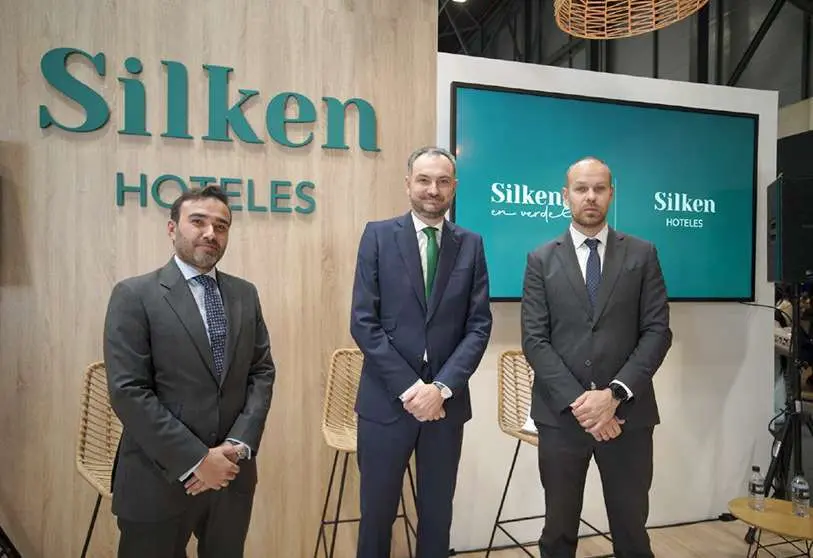Silken Hoteles takes stock of the agreement with Endesa X to reduce its energy consumption and carbon footprint

Within the framework of FITUR 2023, the Silken Hoteles chain, specialising in four-star hotels in Spain, has organised its first 'Silken in Green' conferences to present new sustainability projects and take stock of the company's decarbonisation actions already implemented over the last year. In the first of the two talks, Silken Hoteles wanted to discuss two success stories with Endesa X in its hotels Silken Indautxu, in Bilbao, and Silken Puerta de Valencia.
According to the data provided:
In Valencia the energy saving was 10.4%, i.e. 16,908 euros for the whole year of service (162,344kWh), avoiding 50,813Kg CO2.
In Bilbao the saving was 25.5%, i.e. 23,820 euros counting only 9 months of service, (231,170kWh) with which 72,355Kg CO2 were avoided.
The Silken Hotels chain has entrusted Endesa X with the management and intelligent control of its air conditioning in the Silken Indautxu and Silken Puerta Valencia establishments in Bilbao and Valencia. And this is what they have told us during the "Silken en Verde" conference, which took place at FITUR 2023. The talk was attended by Javier Villanueva, General Manager of Silken Hoteles, and Víctor Varela, Director of B2B Marketing at Endesa X, with the journalist from La Vanguardia, Fernando Valls, as moderator.
A talk that served to discuss the decarbonisation of a company like Silken Hoteles, with 28 establishments under management and seven in commercialisation. "We are proud to announce that SILKEN HOTELES will achieve with Comfort Management in the aforementioned hotels in Bilbao and Valencia a saving that will avoid the total emission of 123,168 kgs of CO2 into the atmosphere each year. It should not be forgotten that the energy consumption of air conditioning and ventilation systems is a major cost item for a hotel chain and its impact on the environment is negative. All companies in the sector should now adopt sustainability and decarbonisation policies to make our sector a green sector. We cannot hide our heads in the sand, the future of the sector has to be sustainable. Otherwise, the viability of the sector would be compromised", explained Javier Villanueva.
"A sector that represents 12% of GDP must be at the forefront," explained Víctor Varela during the talk. "In addition to the policy of energy saving and moving towards the abandonment of fossil fuels, together with Endesa X we are in the process of equipping the entire company with electric chargers for our employees' vehicles. We have a clear roadmap towards a Zero Carbon footprint. We know that it is not a single action, but many small ones that we will be staggering over time with the aim of being a sustainable chain".
And Víctor Varela, B2B Marketing Director at Endesa X, continues: "The government's long-term strategy shows a firm commitment to the decarbonisation of the economy that will serve as a guide to guide investments in the coming years in the sector. Specifically, hotels and accommodation emit more than 264 million metric tonnes of CO2 per year and represent 10% of the country's emissions. Therefore, as I said at the beginning, the sector plays a very important role in the decarbonisation of the country. In order to meet the goal of achieving zero net emissions by 2050, establishments will have to undertake very significant investments to adopt more efficient technologies and switch to renewable energy supply. To this end, the Council of Ministers has recently authorised the distribution of 170 million euros to hotels to finance 2,627 energy efficiency projects, ranging from the installation of solar panels, the replacement of equipment with polluting energy sources or the improvement of building insulation. This is part of the 3.4 billion euros allocated within the Next Generation funds for the reconstruction of tourism activity. Actions will have to justify a 30% reduction in non-renewable primary energy consumption compared to the baseline situation. In addition, it is also planned to allocate more non-refundable aid linked to energy efficiency to be distributed among the autonomous communities and to mobilise private investment in parallel through the Fund for the Competitiveness of Tourism Enterprises (Focit), endowed with 565 million, aimed at actions linked to digitalisation or energy efficiency".









